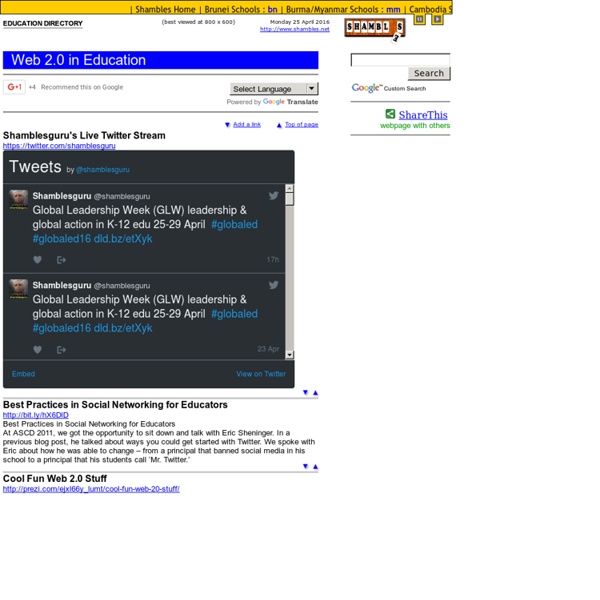



Evaluate Europe - Welcome to the Evaluate-Europe Site E-learning Use of technology in education to improve learning and teaching Educational technology (commonly abbreviated as edutech, or edtech) is the combined use of computer hardware, software, and educational theory and practice to facilitate learning.[1][2] When referred to with its abbreviation, "EdTech", it often refers to the industry of companies that create educational technology.[3][4][5] In EdTech Inc.: Selling, Automating and Globalizing Higher Education in the Digital Age, Tanner Mirrlees and Shahid Alvi (2019) argue "EdTech is no exception to industry ownership and market rules" and "define the EdTech industries as all the privately owned companies currently involved in the financing, production and distribution of commercial hardware, software, cultural goods, services and platforms for the educational market with the goal of turning a profit. Accordingly, there are several discrete aspects to describing the intellectual and technical development of educational technology: B.F. [edit]
Le papier contre l’électronique (2/4) : Lequel nous rend plus in Suite de notre dossier sur ce qui oppose le papier à l’électronique. Après avoir constaté combien la question déclenchait de débats passionnés entre ceux qui viennent de la culture du livre et ceux qui vivent avec la culture du web, il est temps de nous mettre à comprendre l’impact des différences de support. Et notamment de nous demander vraiment si l’un des deux supports est capable de nous rendre plus intelligents. Le calme est bon pour l’esprit La psychologue et neurologue Maryanne Wolf est la directrice du Centre de recherche pour la lecture et le langage de la Tufts University. Caleb Crain, dans le long dossier consacré au « Crépuscule des livres » qu’il livre au NewYorker signale une très intéressante étude pour mesurer la différence entre une lecture attentive et silencieuse et une lecture troublée par un commentaire audio. Reste que ces exemples ne permettent pas de différencier l’impact du support sur la lecture. L’idiotie de nos sociétés n’est pas la faute de la technologie
The DaVinci Institute - The Future of Education by Thomas Frey The pace of change is mandating that we produce a faster, smarter, better grade of human being. Current systems are preventing that from happening. Future education system will be unleashed with the advent of a standardized rapid courseware-builder and a single point global distribution system. “Education is now the number one economic priority in today’s global economy.” – John Naisbitt, Author of Megatrends The following is the result of a collaborative research study conducted by the DaVinci Institute, its members and associated research teams. Introduction Within two years a radical shift will begin to occur in the world of education. While many people are making predictions about the direction that education systems are headed, we have found the best predictors to be hidden in the participative viral systems springing to life in the online world, such as iTunes and Amazon. Lessons from the Ancient World Roman numerals were a system problem, and a huge one at that. Eight Driving Forces
Learn Online Web 2.0 World Wide Web sites that use technology beyond the static pages of earlier Web sites Web 2.0 (also known as participative (or participatory)[1] web and social web)[2] refers to websites that emphasize user-generated content, ease of use, participatory culture, and interoperability (i.e., compatibility with other products, systems, and devices) for end users. The term was coined by Darcy DiNucci in 1999[3] and later popularized by Tim O'Reilly and Dale Dougherty at the first Web 2.0 Conference in 2004.[4][5][6] Although the term mimics the numbering of software versions, it does not denote a formal change in the nature of the World Wide Web,[7] but merely describes a general change that occurred during this period as interactive websites proliferated and came to overshadow the older, more static websites of the original Web.[2] Some Web 2.0 capabilities were present in the days of Web 1.0, but were implemented differently. Some common design elements of a Web 1.0 site include:[17] Search
Le Blog Pédagogique du e-learning ! iCampus: iLabs iLab Project at MIT The iLabs project website has moved to Please register for an iLab Account at and run the iLab microelectronics experiments. Faculty interested in using iLabs in their courses should contact the iLabs Project Team (ilab@mit.edu) and request a group account. About iLabs iLabs is dedicated to the proposition that online laboratories – real laboratories accessed through the Internet – can enrich science and engineering education by greatly expanding the range of experiments that students are exposed to in the course of their education. iLab teams have created remote laboratories at MIT in microelectronics, chemical engineering, polymer crystallization, structural engineering, and signal processing as case studies for understanding the complex requirements of operating remote lab experiments and scaling their use to large groups of students at MIT and around the world. Overview of the iLabs Shared Architecture
OER Handbook/proposed handbook outline From WikiEducator Note: Unless there is feedback to the contrary, this outline will be deprecated in favor of the merged outline. Introduction Why OER? (both motivation and goals) A short history of OERs Models and approaches to OER development * Cathedral and the Bazaar models of content * Produce – consumer versus collaborative peer production Roadmap * Beginner - advanced * OER Lifecycle Basics Get *Using your own resources * Searching and finding [UNESCO 7.1][Also mentioned in UNESCO DIY Resource] * Services/tools across multiple sites * [List of "resource" sites] [UNESCO 7.1.1-7.1.4] o Wikipedia o WikiEducator o Wikiversity o Connexions o LeMill o Flickr o Creative Commons search o Internet archive o Project Gutenberg * Preferred formats (Interoperability) [In the UNESCO doc we have this under publishing rather than getting other peoples' materials? Localize and Remix License User Stories (or maybe clear, concise statements of different licensing perspectives) Use Advanced 6.8 Step-by-step